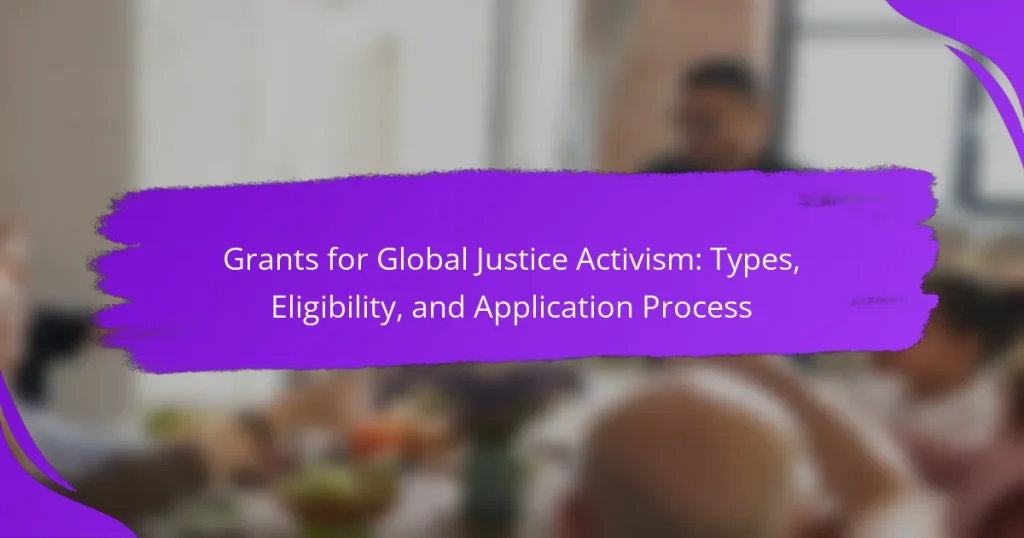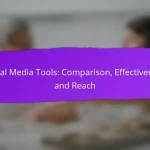Grants for global justice activism provide essential funding to support various initiatives aimed at promoting social equity and human rights. These grants are available from diverse sources, including government agencies, private foundations, and international organizations, each with specific eligibility criteria. The application process involves identifying appropriate funding opportunities, preparing necessary documentation, and submitting a detailed proposal to enhance the likelihood of receiving support.
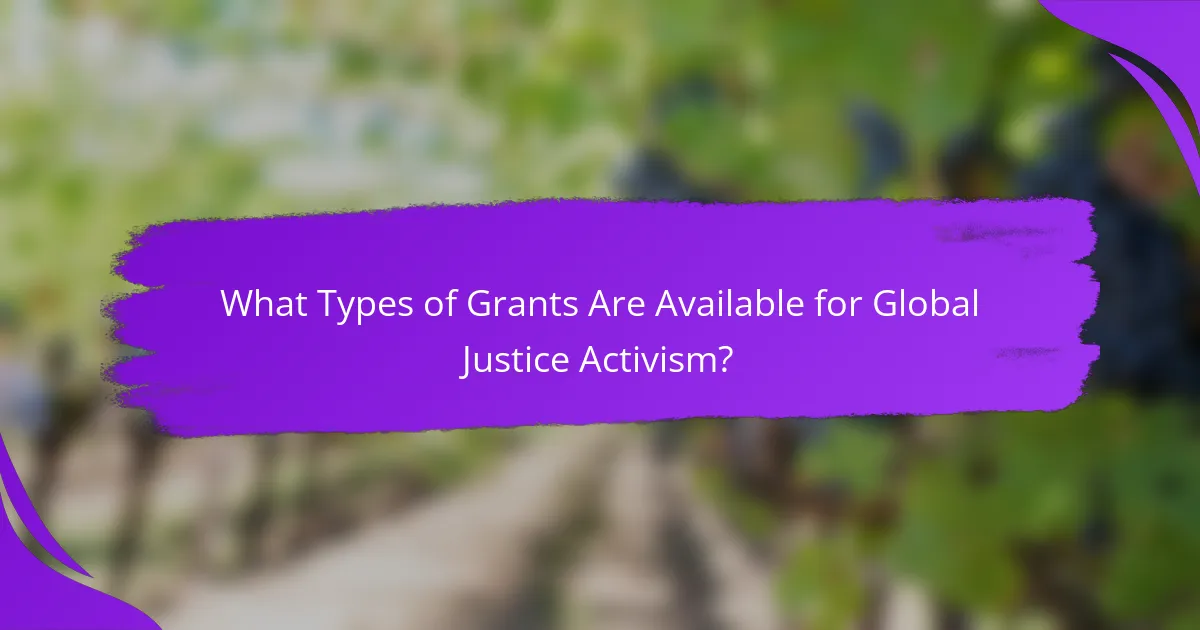
What Types of Grants Are Available for Global Justice Activism?
Various grants support global justice activism, each with distinct sources and requirements. These funding opportunities can come from government entities, private foundations, international organizations, crowdfunding platforms, and corporate social responsibility initiatives.
Government Grants
Government grants for global justice activism are typically funded by national or local agencies aiming to promote social change. These grants often require applicants to demonstrate how their projects align with governmental priorities, such as human rights, environmental protection, or community development.
Eligibility criteria can vary widely, but applicants usually need to be registered non-profits or community organizations. Examples include the U.S. Agency for International Development (USAID) grants or European Union funding programs.
Private Foundation Grants
Private foundations provide grants to support specific causes aligned with their missions. These grants can be more flexible than government funding, allowing for innovative approaches to global justice issues.
Foundations like the Ford Foundation or the Open Society Foundations often focus on specific themes such as racial equality or democratic governance. Applicants should tailor their proposals to fit the foundation’s goals and demonstrate measurable impact.
International Organization Grants
International organizations, such as the United Nations or World Bank, offer grants to initiatives that address global challenges. These grants often focus on large-scale projects that can affect multiple countries or regions.
Applying for these grants typically involves a rigorous proposal process, requiring detailed project plans and evidence of collaboration with local stakeholders. Organizations should be prepared to meet strict reporting and accountability standards.
Crowdfunding Initiatives
Crowdfunding platforms allow individuals and organizations to raise small amounts of money from a large number of people. This method can be particularly effective for grassroots movements and innovative projects in global justice activism.
Platforms like Kickstarter or GoFundMe enable activists to present their causes directly to the public. Successful campaigns often include compelling narratives and clear funding goals, along with engaging visuals to attract potential donors.
Corporate Social Responsibility Grants
Many corporations offer grants as part of their corporate social responsibility (CSR) programs, aiming to give back to communities and support social causes. These grants can be a valuable resource for organizations working on global justice issues.
Companies like Coca-Cola or Microsoft often have specific areas of focus, such as education or sustainability. Applicants should align their projects with the company’s CSR objectives and demonstrate how their work can enhance the company’s community impact.
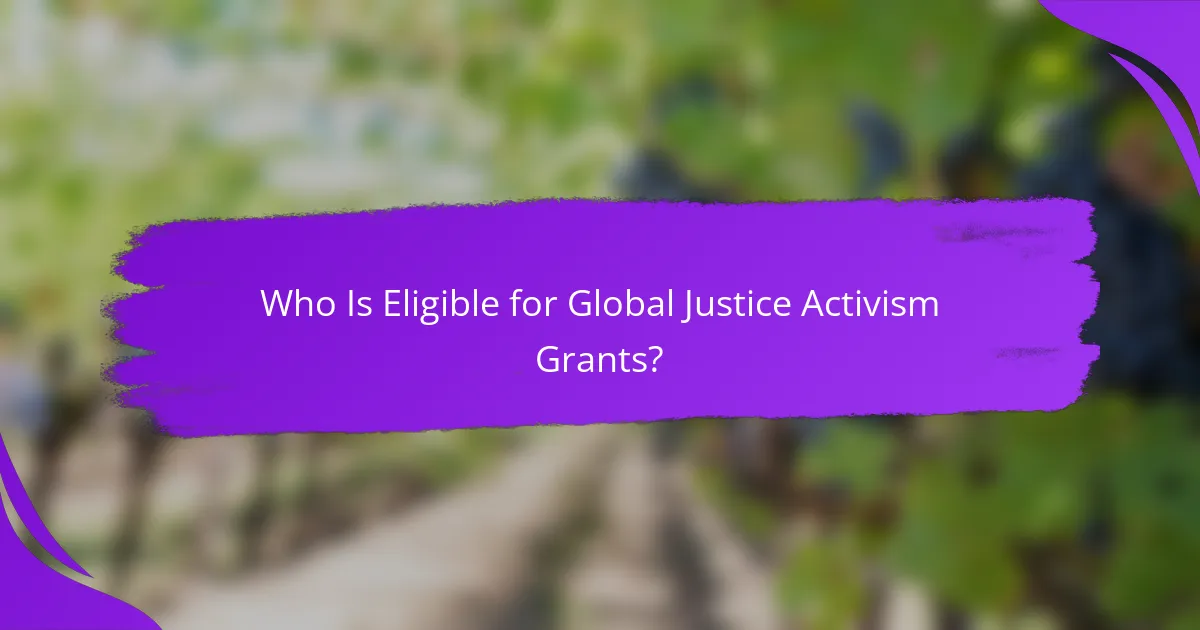
Who Is Eligible for Global Justice Activism Grants?
Eligibility for global justice activism grants typically includes nonprofit organizations, grassroots movements, individual activists, and academic institutions. Each category has specific criteria that applicants must meet to qualify for funding.
Nonprofit Organizations
Nonprofit organizations are often the primary recipients of global justice activism grants. To qualify, these organizations must demonstrate a clear mission aligned with justice initiatives, such as human rights advocacy, environmental protection, or social equity.
Applicants should provide evidence of their impact, such as previous projects, community engagement, and financial transparency. Many grants require nonprofits to have a certain level of operational history, often ranging from one to three years.
Grassroots Movements
Grassroots movements can also apply for global justice activism grants, especially if they focus on community-led initiatives. These movements typically need to show how their activities empower local populations and address systemic issues.
Successful applications often highlight community involvement, innovative strategies, and measurable outcomes. Funders may look for movements that have a clear plan for sustainability and growth, even if they are relatively new.
Individual Activists
Individual activists may qualify for grants that support their projects or initiatives aimed at promoting global justice. Eligibility often depends on the activist’s track record, the significance of their work, and the potential impact of their proposed project.
Applicants should clearly articulate their objectives and how the funding will facilitate their activism. Some grants may require endorsements from established organizations or networks to validate the activist’s efforts.
Academic Institutions
Academic institutions can receive grants to support research and projects related to global justice. These grants often fund studies that aim to inform policy, enhance public understanding, or develop innovative solutions to social issues.
Eligibility typically requires a proposal that outlines the research objectives, methodology, and expected outcomes. Institutions may also need to demonstrate collaboration with community organizations or activists to ensure practical applications of their findings.
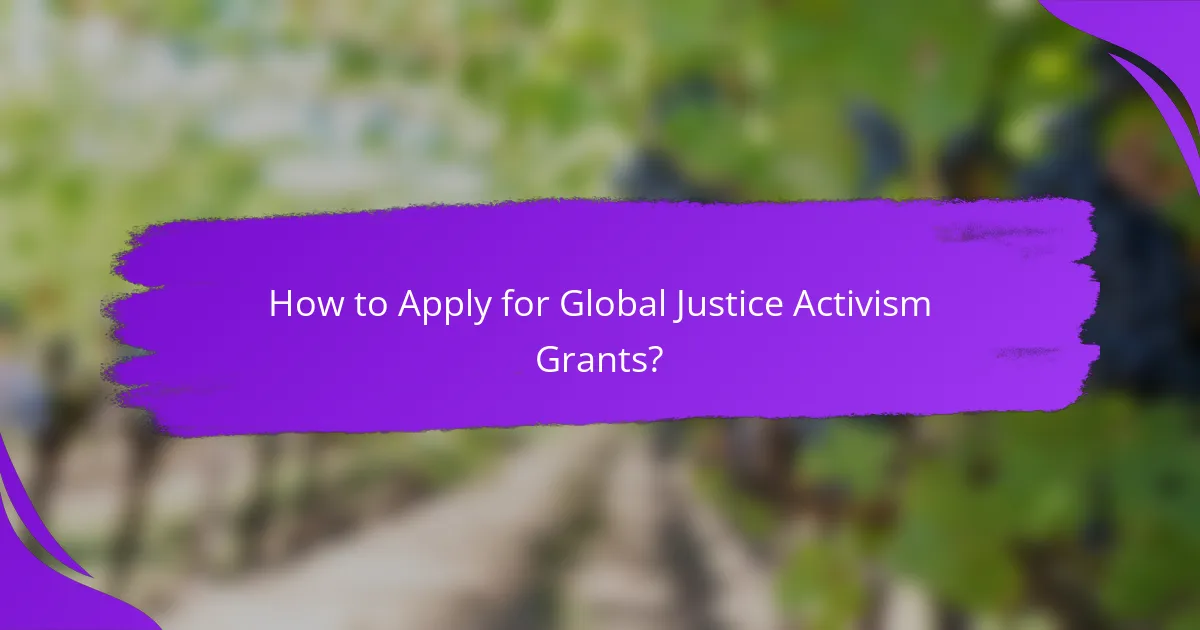
How to Apply for Global Justice Activism Grants?
Applying for global justice activism grants involves several key steps, including identifying suitable opportunities, gathering necessary documentation, submitting your application online, and following up with grantors. Each step requires careful attention to detail to enhance your chances of securing funding for your initiatives.
Research Grant Opportunities
Start by identifying grant opportunities that align with your activism goals. Look for foundations, government programs, and international organizations that fund projects related to social justice, human rights, and environmental sustainability. Websites like Grants.gov or the Foundation Center can be valuable resources.
Consider the eligibility criteria, funding amounts, and application deadlines for each grant. Some grants may focus on specific regions or issues, so ensure your project fits their priorities. Joining relevant networks or forums can also help you discover new opportunities.
Prepare Required Documentation
Gather all necessary documentation before applying for grants. Common requirements include a project proposal, budget outline, organizational information, and letters of support. Each grant may have unique requirements, so carefully review the guidelines provided by the grantor.
Ensure your project proposal clearly outlines your objectives, methods, and expected outcomes. A well-structured budget should detail how funds will be allocated, demonstrating fiscal responsibility. Keep your documentation organized to streamline the application process.
Submit Application Online
Most grant applications are submitted online through the grantor’s website. Create an account if required, and follow the instructions for completing the application form. Pay close attention to formatting guidelines and word limits.
Before submitting, double-check your application for accuracy and completeness. Some platforms allow you to save your progress, so take advantage of this feature to review your work. Submitting early can help avoid last-minute technical issues.
Follow Up with Grantors
After submitting your application, it’s important to follow up with the grantors. Send a polite email or make a phone call to confirm receipt of your application and inquire about the timeline for decisions. This shows your commitment and can help you stay informed.
If you receive funding, be sure to thank the grantor and maintain communication throughout your project. If your application is unsuccessful, consider requesting feedback to improve future submissions. This proactive approach can enhance your chances of success in subsequent applications.
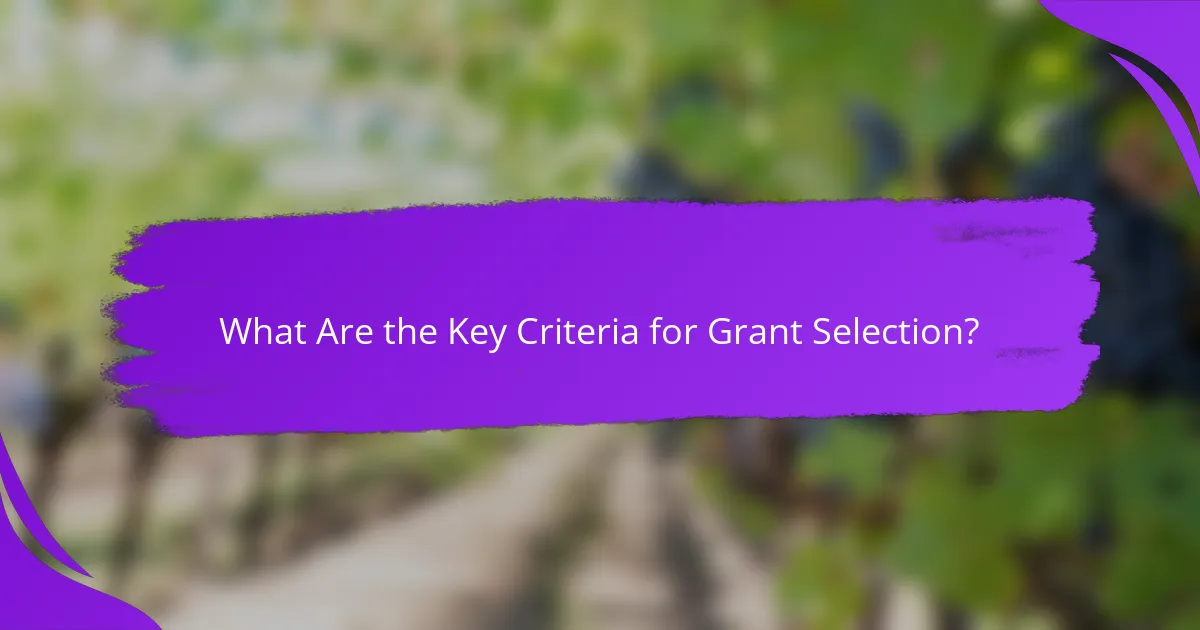
What Are the Key Criteria for Grant Selection?
The key criteria for grant selection typically include alignment with the grantor’s mission, potential for impact, and a well-justified budget. Understanding these factors can significantly enhance the chances of securing funding for global justice activism projects.
Alignment with Grantor’s Mission
Grantors often have specific missions or goals that guide their funding decisions. Projects that closely align with these missions are more likely to receive support. Research the grantor’s objectives and tailor your proposal to demonstrate how your project contributes to their mission.
For example, if a grantor focuses on human rights, emphasize how your activism addresses violations in that area. Highlighting shared values can create a compelling case for funding.
Impact Potential
Grantors seek projects that can create significant and measurable impact. Clearly outline the expected outcomes of your project and how they will contribute to social change. Use data or case studies to illustrate potential effectiveness.
Consider including metrics for success, such as the number of individuals served or changes in community awareness. A well-defined impact strategy can help convince grantors of your project’s viability.
Budget Justification
A detailed and reasonable budget is crucial for grant applications. Ensure that your budget aligns with project goals and includes all necessary expenses, such as personnel, materials, and outreach efforts. Justify each line item to show how it supports the overall mission.
Common pitfalls include underestimating costs or failing to explain why certain expenses are necessary. Providing a clear budget narrative can strengthen your application and demonstrate fiscal responsibility.
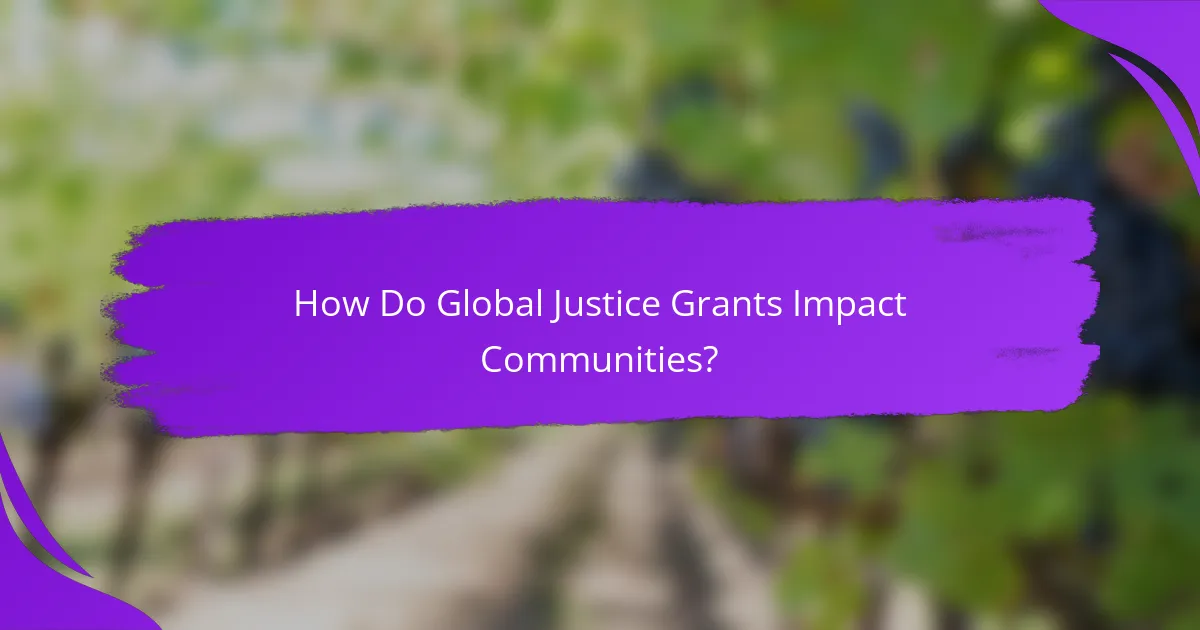
How Do Global Justice Grants Impact Communities?
Global justice grants significantly enhance communities by funding initiatives that promote equity, human rights, and social justice. These financial resources empower local organizations to implement projects that address systemic issues, fostering sustainable change and community resilience.
Types of Global Justice Grants
Global justice grants come in various forms, including project grants, operational support, and capacity-building funds. Project grants typically finance specific initiatives aimed at addressing social justice issues, while operational support helps organizations cover ongoing expenses. Capacity-building grants focus on strengthening the skills and infrastructure of organizations to enhance their effectiveness.
Examples of types of grants include government-funded programs, private foundation grants, and crowdfunding efforts. Each type has its own application process and eligibility criteria, which can vary widely based on the funding source.
Eligibility for Global Justice Grants
Eligibility for global justice grants often depends on the organization’s mission, structure, and the specific goals of the grant. Many grants are available to non-profits, community-based organizations, and sometimes individuals engaged in activism. Applicants typically need to demonstrate a clear alignment with the grant’s objectives and show how their work will benefit the community.
Some grants may have specific geographical or thematic restrictions, such as focusing on marginalized communities or particular social issues. It’s essential to carefully review the eligibility criteria before applying to ensure compliance.
Application Process for Global Justice Grants
The application process for global justice grants generally involves several key steps. First, applicants must identify suitable grants that align with their mission and project goals. Next, they should prepare a compelling proposal that outlines their project, budget, and expected impact.
Many grant applications require supporting documents, such as organizational budgets, letters of support, and proof of nonprofit status. It’s advisable to follow the application guidelines closely and submit all required materials by the deadline to avoid disqualification.
